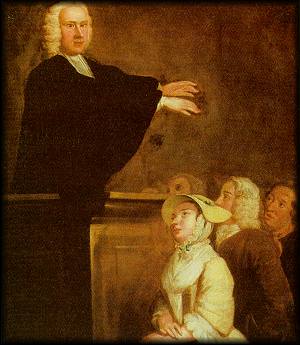
The Great Awakening
| The Congregational Church was the dominant religious institution in the Northern Colonies and it was supported through taxes as had been the Church of England back home. The Colonialists saw considerable economic success in early times so that, by the end of the first quarter of that century many concerned themselves more with this world than the next. There was general agreement that religion in the British Colonies was in decline. Perhaps the most profound intellectual development of the period was the thinking of Johnathan Edwards. Edwards emphasized Calvin's concept of Man, helpless in the hands of an all-powerful God, but he also declared that one must do more than understand sinfulness, one had to feel it. Conversion, then, was a profoundly emotional experience. Perhaps the most profound social development of the period was the charismatic preaching of George Whitefield (painting above), an English man who made it his mission in life to carry Edwards' message to the masses by holding revival meetings all over the Northern Colonies. The results were phenomenal, but they caused deep divisions in the Colonies. New believers called themselves "the New Lights". People left the Congregational Church to form the Free-Will Baptists. Many of these, Moses and Jane included, moved to New Hampshire. |